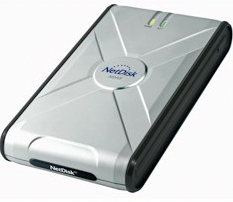History 2003: First HDD That Pugs into Ethernet
Comes from previously unknown start-up XiMeta.
This is a Press Release edited by StorageNewsletter.com on November 7, 2023 at 2:01 pmNot, it’s not a NAS utilizing file systems and an IP address. Instead it’s a hard disk drive that plugs directly into an Ethernet port, i.e. a local disk via LAN. It permits backup on a local network while it also has the capacity to serve as a backup devices for an individual PC using its USB 2.0 interface.

The idea comes from a previously unknown start-up, XiMeta Technology, based in Irvine, CA, with R&D facilities in Korea, launched a year ago under founder, CEO and CTO Han-gyoo Kim, a professor of Computer Engineering at Hong Kong University in Seoul, Korea.
XiMeta calls his device NetDisk, characterizing it as “network direct-attached storage.” It exists in several versions, a portable unit based on a 7,200rpm 3.5-inch HDD with capacities of either 80, 120 or 160GB, priced respectively at $269, $319 and $399, as well as another configuration with a removable 40GB 4,200rpm 2.5- inch cartridge disk drive.
The IDE 3.5-inch drives are furnished by Samsung, while the subsystems are supplied by Audavi, a company headed by Steve Kaczeus, a pioneer of 5.25-inch technology during the period he worked at Seagate, and more recently the founder of Datazone, another firm involved in ruggedized removable and external disk drives.
XiMeta contributes its proprietary NDAS chip as well as special software to be installed on the PCs running NetDisk.
The solution should be available in June with 10/100Mb/s Ethernet (1Gb/s is planned for later).
XiMeta is targeting SMBs and also aims for home networking, multimedia storage, surveillance and automotive applications.
There are certainly advantages to connecting a HDD directly to the Ethernet, thereby bypassing the issue of a file system, although NetDisk does require special software (in Windows or MacOS) on each computer that accesses the device.
What’s more, in addition to the Ethernet connection, the drive requires an external power source, since Ethernet does not supply enough current (unlike USB 2.0, if the demands in electricity aren’t too great).
NetDisk contains a proprietary chip and software, while in the future we can expect to see iSCSI disk drives (based, however, on costlier SCSI units) that are also directly connectable to Ethernet, based this time on an open standard.
Edward Park, XiMeta’s president, is unconcerned: “It won’t be a competitor for us, even in the future, since iSCSi is a kind of SAN, which uses TCP/IP. iSCS/ is a/so experiencing complicated processing issues inside. NetDisk is very simple because it has its own protocol. As we targeted SOHO, home and workgroups in the enterprise market, it is not routable via traditional router.”
This article is an abstract of news published on issue 184 on May 2003 from the former paper version of Computer Data Storage Newsletter.
Note: There never was a big market for Ethernet HDDs.














 Subscribe to our free daily newsletter
Subscribe to our free daily newsletter

